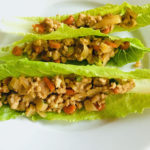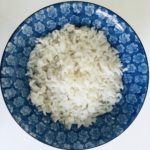A new study says that perhaps introducing highly allergenic foods (like peanut) early in life would increase tolerance later in life. This goes against the previous belief that food allergies develop when the allergenic food is introduced too early. What’s the right answer? Unfortunately, no one knows (yet).
My Daughter #1 is allergic to eggs, cashews and avocados — things I ate a LOT of while pregnant and nursing. This example would seem to support the theory that early exposure (via breastmilk) triggers the allergies. Now I am nursing my Daughter #2 and trying not to eat a lot of the things Daughter #1 is allergic to, but am I doing the right thing?? So confusing! Sigh. Stay tuned…







gladys says
Don’t kick yourself over what you did or didn’t eat when pregnant.
I didn’t eat peanuts — and my son is highly allergic to them. I switched to almond butter instead of peanut butter — and he’s not allergic to almonds. I also ate cashews and pecans — and he’s allergic to them, but not as much as to peanuts. And I drank a LOT of milk, and he’s moderately allergic to milk.
You can’t win. And the first thing my allergist said was, “it’s not your fault, so don’t beat yourself up over it.”
alison says
Thanks Gladys for the pep talk — sometimes I think I can control things and then I think I have no control!
beth faunce says
first of all i just wanted to say how awesome your blogs are! My five year old son has many food allergies: milk, egg, peanut, tree nuts, peas, greenbeans and strawberries. i nursed him till a little over age two due to all his allergies his first reaction was around 6 months of age that’s when we had him tested and it showed milk was one of his allergies. now i ate alot of cheese when nursing him (i do not eat meat, eggs or milk (will eat things with eggs or milk in them but not just those things..if that makes sense) he never showed reactions to things i ate..yes he spit up alot as a baby but around 9 months that stopped.
my second son has NO food allergies ..NONE.
my daughter who is almost 6 months of age hasn’t showed anything yet but i haven’t given her anything other than fruit and veggies yet ..and my oldest son didn’t show his pea and greenbean allergy till he was around 16 months old.
now has anyone heard of csections raising the chance of having food allergies?? first son=csection ..second son and daughter VBACS and no known allergies with them.
alison says
Beth,
Here is an article about C-sections and food allergies:
08 Sep 2003
(USA) – Some infants who are delivered by cesarean section may have an increased risk of developing food allergies, according to a new report published in the August issue of the Journal of Allergy and Clinical Immunology.
Investigators have identified a relationship between cesarean section delivery and subsequent food allergy in children of mothers with allergies.
Cesarean delivery might delay the growth of normal intestinal flora–bacteria that normally line the intestine–in the newborn infant, Dr. Merete Eggesbo, of the Norwegian Institute of Public Health in Oslo, and colleagues note. One theory is that delays or abnormalities in the growth of these bacteria may increase the risk of allergic disease.
To further investigate, the researchers obtained data on mode of delivery, maternal or infant use of antibiotics, and potential confounding factors in a population of 2803 children.
The main outcome measures were the parent’s opinions of their child’s reaction to egg, fish, or nuts. The child’s reaction to egg at 2.5 years of age was also objectively confirmed by laboratory tests.
For children with allergic mothers, the researchers found that cesarean section was associated with a sevenfold increased rate of parental reports of reactions to egg, fish, or nuts in children. The risk of confirmed egg allergy was increased by fourfold in these children.
For children without allergic mothers, the association between cesarean section and the risk of food allergy was weak and not significant.
There was no association between maternal or infant antibiotic use and an increased risk of food allergy.
These results ‘lend circumstantial support to the importance of microbiologic stimuli in early life,’ Eggesbo and colleagues conclude. They suggest that this might be another factor to consider when mode of delivery is discussed with pregnant women.
SOURCE: Journal of Allergy and Clinical Immunology, August 2003.